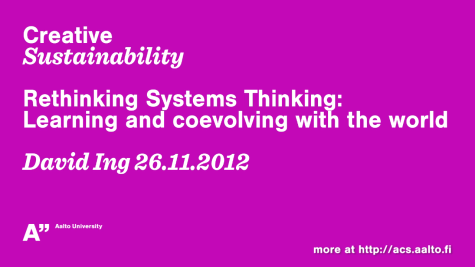In the ISSS 2022 Plenary talk, the first 25 minutes were a blast through (a) the rising interest in system(s) change(s); (b) appreciative systems (Vickers); (c1) the philosophy of architectural design; (c2) the philosophy of ecological anthropology; (c3) the philosophy of Classical Chinese Medicine; (c4) the philosophy of rhythms; and (d) methods of multiparadigm inquiry, and open theorizing.
The formal publication of the manuscript in the Proceedings of the 66th Annual Meeting of the International Society for the Systems Sciences unpacks the content for those with an interest in really understanding the breadth of domains that the Systems Changes Learning Circle has explored, from 2019 through 2022.
This proceedings release is a milestone, as a coherent work that has been lightly reviewed. In a more thorough process of peer review, a publication may be further refined by anonymous comments requesting clarification of some points, or suggestions that some sections could be abbreviated. My style of writing presumes that readers might not know all of the references, so I’m explicit about sources. (This also helps me remember from whom I’m learning!)
Here’s the abstract, as it appears in the proceedings.
Abstract
In which ways is the subject of systems change(s), as a first-class concept, distinct from a reduction into (i) systems and (ii) changes? For practice, theory, and methods to be authentically rigourous, the philosophy underlying an approach to systems changes can be explicated. Through an appreciative systems framework, presumptions are surfaced as to (i) what are and are not systems changes; (ii) when, where, and for whom, systems changes are prioritized for attention; and (iii) how systems changes should be addressed.… Read more (in a new tab)
In the ISSS 2022 Plenary talk, the first 25 minutes were a blast through (a) the rising interest in system(s) change(s); (b) appreciative systems (Vickers); (c1) the philosophy of architectural design; (c2) the philosophy of ecological anthropology; (c3) the philosophy of Classical Chinese Medicine; (c4) the philosophy of rhythms; and (d) methods of multiparadigm inquiry, and open theorizing.
The formal publication of the manuscript in the Proceedings of the 66th Annual Meeting of the International Society for the Systems Sciences unpacks the content for those with an interest in really understanding the breadth of domains that the Systems Changes Learning Circle has explored, from 2019 through 2022.
This proceedings release is a milestone, as a coherent work that has been lightly reviewed. In a more thorough process of peer review, a publication may be further refined by anonymous comments requesting clarification of some points, or suggestions that some sections could be abbreviated. My style of writing presumes that readers might not know all of the references, so I’m explicit about sources. (This also helps me remember from whom I’m learning!)
Here’s the abstract, as it appears in the proceedings.
Abstract
In which ways is the subject of systems change(s), as a first-class concept, distinct from a reduction into (i) systems and (ii) changes? For practice, theory, and methods to be authentically rigourous, the philosophy underlying an approach to systems changes can be explicated. Through an appreciative systems framework, presumptions are surfaced as to (i) what are and are not systems changes; (ii) when, where, and for whom, systems changes are prioritized for attention; and (iii) how systems changes should be addressed.… Read more (in a new tab)



